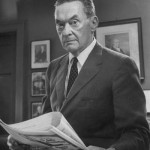Law School and the Hero’s Journey
 Most law school professors are conflicted about their own experiences as law students. We remember law school as an exceedingly unpleasant place, filled with crushing amounts of work and a hostile professoriate. It is not surprising that law school is often depicted as a de-humanizing experience in the media, whether in books like Scott Turow’s One L or in movies such as The Paper Chase. This recent post, by Professor Mazzie, seems to reflect a pervasive concern that the demands of law school can even erode our own sense of identity, a process that ultimately transforms students into soul-less apparatchiks of the legal system. I, myself, have felt this way at times.
Most law school professors are conflicted about their own experiences as law students. We remember law school as an exceedingly unpleasant place, filled with crushing amounts of work and a hostile professoriate. It is not surprising that law school is often depicted as a de-humanizing experience in the media, whether in books like Scott Turow’s One L or in movies such as The Paper Chase. This recent post, by Professor Mazzie, seems to reflect a pervasive concern that the demands of law school can even erode our own sense of identity, a process that ultimately transforms students into soul-less apparatchiks of the legal system. I, myself, have felt this way at times.
Some law professors (and I do not intend to include my colleagues in this group) respond to these conflicted feelings by endeavoring to reduce the stress of law school. They reject the Socratic method as unnecessarily antagonistic and outdated. They reduce the workload, and their expectations of the students, in order to leave more room in the students’ lives for the “real world.” They may even take a rather forgiving view of the grading process. Their intention is to make the current generation of law students happier during their law school experience than these professors remember being during their own.
The odd thing is that, when law students are provided with this de-stressed version of law school, I have found them to be even less satisfied with their law school experience. Law students come to law school expecting to be challenged. They want to have their abilities tested, and even found wanting on occasion. In some sense, when students find the law school experience to be too easy, the law school experience loses meaning for them.

 Three recent events have added a new wrinkle to a debate that has been taking place among legal scholars: what, if anything, does it mean to be both a Catholic and a Supreme Court Justice?
Three recent events have added a new wrinkle to a debate that has been taking place among legal scholars: what, if anything, does it mean to be both a Catholic and a Supreme Court Justice? It is difficult to watch the video of the various “town hall meetings” and constituent listening sessions that have taken place during the current congressional recess. The overwhelming feeling engendered by these scenes of screaming faces is a feeling of despair for the future of democracy itself. After all, town hall meetings hold an important place in our nation’s history as a symbol of the general public’s continuing participation in their own democratic government.
It is difficult to watch the video of the various “town hall meetings” and constituent listening sessions that have taken place during the current congressional recess. The overwhelming feeling engendered by these scenes of screaming faces is a feeling of despair for the future of democracy itself. After all, town hall meetings hold an important place in our nation’s history as a symbol of the general public’s continuing participation in their own democratic government.